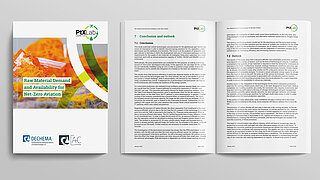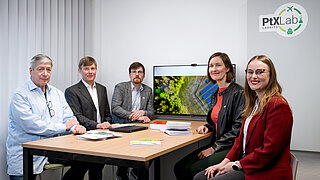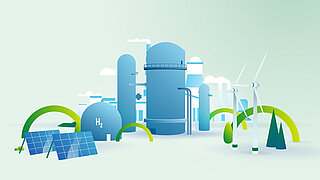PtX Lab Lausitz publishes study on raw material availability for net-zero aviation
Copyright: Shutterstock / Cagla Acikgoz
PtX Lab study ‘Raw Material Demand and Availability for Net-Zero Aviation’ highlights raw material requirements of critical minerals and metals for climate-neutral aviation
According to the PtX Lab study ‘Raw Material Demand and Availability for Net-Zero Aviation’, structural and political measures are just as crucial as technological optimisations for the sustainable and long-term economic production of e-kerosene, which is as independent as possible of critical raw materials.
The study was recently conducted by DECHEMA Gesellschaft für Chemische Technik und Biotechnologie e.V. on behalf of PtX Lab Lausitz. The authors Angee Fehling and Dr Dinh Du Tran (DECHEMA e.V.) and the project managers Anja Paumen and Dr Lorenzo Cremonese (PtX Lab Lausitz) have investigated which mineral raw materials are required for jet fuel production.
They identified a total of 144 different production routes for electricity-based kerosene and, in addition to the criticality of the necessary raw materials, also considered the material input required for extraction and processing. The results show which technologies and sustainable production routes can be used to produce sufficient quantities of jet fuel.

Raw Material Demand and Availability for Net-Zero Aviation
PtX Lab Study | 01/2025 I Topic: Ressources I 237 Pages
Pre-order study (Printed version available from mid Feb. 2025)
Resource coverage in aviation: cobalt, copper and co.
At least five million tonnes of e-kerosene is the amount that will have to be refuelled at German airports in line with quotas by 2050. To ensure this production volume, about three times as much material will be needed as before. This corresponds to around 16 million tonnes of raw materials, including overburden. Of particular concern are those metals and minerals that are in demand in other transformative industries and have already been classified as critical by the European Union.
According to the authors of the study, shortages are to be feared, among other things, for cobalt and platinum, which are often used in catalytic converters, and iridium, which is used in certain electrolysers. However, the more readily available raw materials copper and zinc, which are also used in catalysts, and the less critical nickel should also be handled in a way that conserves resources as much as possible.

Copyright: PtX Lab Lausitz / Steffen Rasche
Mineral raw materials are crucial for the success of the energy transition and the transformation of industries. It is therefore extremely important to identify which raw materials are needed in the various industrial sectors of the EU and for how long.
Study shows ways to produce sufficient quantities of jet fuel
Technological innovation alone will not bring about the transformation of aviation. The climate targets can only be achieved by completely substituting fossil kerosene with sustainable alternatives. The study identifies the following specific steps, among others:
- Focusing on the sub-processes that conserve the most resources to produce jet fuel along the entire value chain
- Integrating e-kerosene technologies into existing infrastructures
- Establishing international partnerships and secure supply chains
- Promoting recycling strategies and an internationally coordinated, sustainable circular economy
About the study
The PtX Lab study ‘Raw Material Demand and Availability for Net-Zero Aviation’ was prepared by DECHEMA on behalf of PtX Lab Lausitz. The 237-page publication was produced under the leadership of the head of PtX Lab Lausitz, Dr Harry Lehmann, and Anja Paumen and Dr Lorenzo Cremonese, the coordinators of the PtX Lab working group ‘Resources’. The working group is addressing the availability of critical raw materials, rare earths and other materials that will be needed as Power-to-Liquid (PtL) products are rolled out.
Contact
Dr
Harry Lehmann
Head of PtX Lab Lausitz
+49 151 40 171 692
Write E-Mail
more information
Contact
Christin Heldt
Communication Expert
+49 162 72 44 610
Write E-Mail
more information

